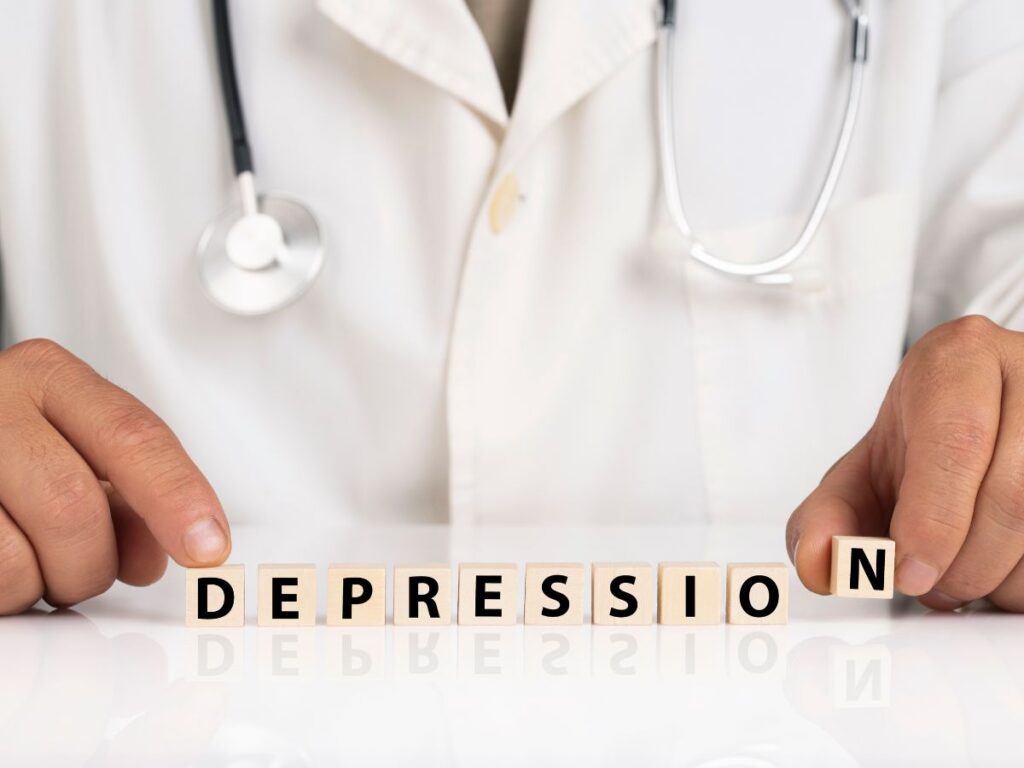What Is Depression?
Depression is a mood disorder that causes persistent feelings of sadness and loss of interest. Also known as major depressive disorder or clinical depression, it affects how you feel and think. are and behave and can lead to various emotional and physical problems.
You may have trouble doing normal daily activities and sometimes feel as if life is not worth living. Depression affects more than 25 percent of adults in the U.S. and an estimated worldwide.
Affecting 350 million people, this disorder is still misunderstood. About 17 percent of the American population will experience major depression at least once in their lifetime.
Common symptoms of Depression include:
Persistent Sadness:
Feeling down or sad for an extended period, often without a clear reason.
Loss of Interest or Pleasure:
Losing interest in activities that were once enjoyable, including hobbies and social interactions.
Changes in Sleep Patterns:
Insomnia or oversleeping can be indicators of depression.
Fatigue:
Feeling constantly tired and lacking energy, even after a full night’s sleep.
Changes in Appetite:
Significant weight loss or gain due to changes in eating habits.
Difficulty Concentrating:
Trouble focusing, making decisions, or remembering things.
Feelings of Guilt or Worthlessness:
Persistent negative thoughts about oneself and a sense of inadequacy.
Physical Symptoms:
Some individuals may experience physical symptoms like headaches or stomachaches that don’t have a clear medical explanation.
Isolation:
Withdrawing from friends, family, and social activities.
Depression can have a variety of causes, including genetic, biological, environmental, and psychological factors. It is essential to recognize the symptoms and seek professional help for an accurate diagnosis and appropriate treatment.
Treatment options may include psychotherapy, medication, or a combination of both, depending on the severity of the depression.
Just Feeling Sad
Feelings of constant sadness, but the symptoms are not limited to those emotions.
People who are depressed may also complain of fatigue, sleeping less or sleeping too much, difficulty making decisions, restlessness, and other physical symptoms.
Depression is a common emotion that affects everyone, with symptoms lasting more than two weeks.

Is Depression a Sign of Weakness?
Many people refuse treatment to avoid the embarrassment they feel, blame themselves, think they should be able to handle themselves, or blame family and friends.
They can blame the way they feel without recognizing that this is a real and serious illness that needs attention.
Do Only Women Get Depression?
It’s true that women are 70 percent more likely to suffer from it than men, but men are not immune. May be ashamed to admit it and may refuse treatment in an effort to maintain power and ego semblance.
Coping strategies are often different for men and include substance abuse, negative behaviors, inappropriate anger or escapist behaviors, such as over-involvement in work or sports.
Medicines Are Available for Treatment of Depression
Taking prescription antidepressants is not the only way to combat major depression. Many studies have found that psychotherapy, especially talk-behavioral therapy, can be an effective treatment for patients suffering from negative thoughts and behaviors.
One begins this therapy by learning to recognize and then be able to change one’s goals and actions in any given situation.
Suffering from Various Diseases
People who suffer from it may also experience other physical symptoms such as headache, stomach ache, indigestion, joint pain, back pain, chest tightness or difficulty breathing, etc.
Pain and depression are closely related to the neurotransmitters serotonin and Norepinephrine is associated with pain and mood, and when imbalanced, both depression and pain can result.
Depression Is Only Caused by Traumatic Life Events
It’s true that traumatic situations such as a job or the loss of a loved one or traumatic childhood experiences can lead to it. With or without apparent cause, you or someone you know may experience symptoms
These include loss of interest in previously enjoyable activities, changes in sleep patterns, loss of energy, feelings of worthlessness, inability to concentrate, changes in appetite, irritability or suicidal thoughts that last almost every day for two weeks or more.
If you feel depressed, make an appointment with your doctor as soon as possible. If you avoid treatment, talk to a friend or loved one, a healthcare professional or someone else you trust.

What are the types of Depression?
What are the top 3 symptoms of Depression?
Depression can manifest in various ways, and the severity and combination of symptoms can differ among individuals. However, three of the top and commonly observed symptoms include:
Persistent Sadness or Low Mood:
- A pervasive and lasting feeling of sadness or emptiness.
- Difficulty finding joy or pleasure in activities that were once enjoyable.
- A general sense of hopelessness about the future.
Loss of Interest or Pleasure (Anhedonia):
- Marked reduction or complete loss of interest in activities that were previously engaging.
- Diminished enthusiasm for social interactions, hobbies, work, or other once-enjoyable pursuits.
- Difficulty motivating oneself to start or complete tasks.
Fatigue and Lack of Energy:
- Persistent feelings of fatigue, even after adequate rest or sleep.
- A sense of physical and mental exhaustion that makes daily activities challenging.
- Difficulty concentrating or making decisions due to low energy levels.
It’s important to note that these symptoms are just a subset of the broader range of manifestations associated with depression. Individuals may also experience changes in appetite, sleep disturbances, feelings of worthlessness or guilt, difficulty concentrating, and, in severe cases, thoughts of death or suicide.
The presence and intensity of these symptoms can vary, and a professional assessment is crucial for an accurate diagnosis and appropriate treatment.
If you or someone you know is experiencing symptoms, seeking help from a mental health professional is recommended.
Last Words for Depression,
dispelling misconceptions is crucial for fostering a better understanding of this pervasive mood disorder. Depression, categorized as a major depressive disorder, goes beyond occasional sadness and encompasses a range of symptoms that impact both emotional and physical well-being.
With over 25 percent of adults in the U.S. affected and a staggering 350 million people worldwide, it remains a prevalent yet often misunderstood condition.

Contrary to some misconceptions, depression is not merely feeling sad; it involves a complex interplay of symptoms, including changes in sleep patterns, fatigue, difficulty concentrating, and physical symptoms like headaches or stomachaches.
Many individuals avoid seeking treatment due to societal stigmas, self-blame, or a belief that they should handle it on their own. Recognizing depression as a legitimate and serious illness is a crucial step towards effective intervention.
In light of these misconceptions, seeking professional help is emphasized. Whether through medication, psychotherapy, or a combination of both, effective treatment requires individualized care.
Timely intervention and open communication with healthcare professionals, friends, or loved ones play a pivotal role in addressing depression and promoting overall well-being.
If you or someone you know is experiencing symptoms of depression, reaching out for support is a crucial step toward healing and recovery.



